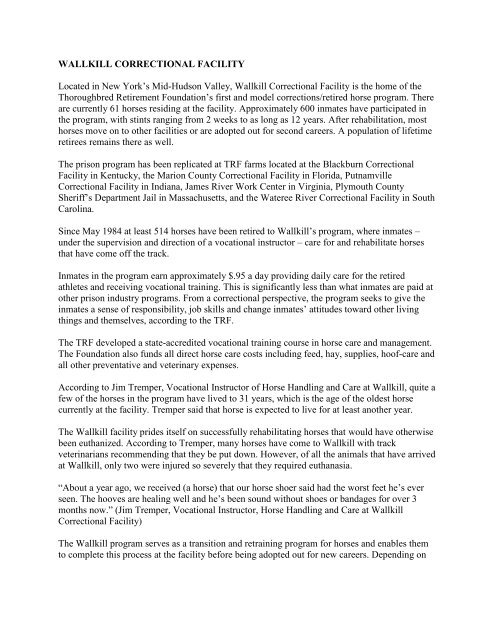Retired Racehorses
tfrr_reportandappendicesfinal
tfrr_reportandappendicesfinal
- No tags were found...
Create successful ePaper yourself
Turn your PDF publications into a flip-book with our unique Google optimized e-Paper software.
WALLKILL CORRECTIONAL FACILITY<br />
Located in New York‟s Mid-Hudson Valley, Wallkill Correctional Facility is the home of the<br />
Thoroughbred Retirement Foundation‟s first and model corrections/retired horse program. There<br />
are currently 61 horses residing at the facility. Approximately 600 inmates have participated in<br />
the program, with stints ranging from 2 weeks to as long as 12 years. After rehabilitation, most<br />
horses move on to other facilities or are adopted out for second careers. A population of lifetime<br />
retirees remains there as well.<br />
The prison program has been replicated at TRF farms located at the Blackburn Correctional<br />
Facility in Kentucky, the Marion County Correctional Facility in Florida, Putnamville<br />
Correctional Facility in Indiana, James River Work Center in Virginia, Plymouth County<br />
Sheriff‟s Department Jail in Massachusetts, and the Wateree River Correctional Facility in South<br />
Carolina.<br />
Since May 1984 at least 514 horses have been retired to Wallkill‟s program, where inmates –<br />
under the supervision and direction of a vocational instructor – care for and rehabilitate horses<br />
that have come off the track.<br />
Inmates in the program earn approximately $.95 a day providing daily care for the retired<br />
athletes and receiving vocational training. This is significantly less than what inmates are paid at<br />
other prison industry programs. From a correctional perspective, the program seeks to give the<br />
inmates a sense of responsibility, job skills and change inmates‟ attitudes toward other living<br />
things and themselves, according to the TRF.<br />
The TRF developed a state-accredited vocational training course in horse care and management.<br />
The Foundation also funds all direct horse care costs including feed, hay, supplies, hoof-care and<br />
all other preventative and veterinary expenses.<br />
According to Jim Tremper, Vocational Instructor of Horse Handling and Care at Wallkill, quite a<br />
few of the horses in the program have lived to 31 years, which is the age of the oldest horse<br />
currently at the facility. Tremper said that horse is expected to live for at least another year.<br />
The Wallkill facility prides itself on successfully rehabilitating horses that would have otherwise<br />
been euthanized. According to Tremper, many horses have come to Wallkill with track<br />
veterinarians recommending that they be put down. However, of all the animals that have arrived<br />
at Wallkill, only two were injured so severely that they required euthanasia.<br />
“About a year ago, we received (a horse) that our horse shoer said had the worst feet he‟s ever<br />
seen. The hooves are healing well and he‟s been sound without shoes or bandages for over 3<br />
months now.” (Jim Tremper, Vocational Instructor, Horse Handling and Care at Wallkill<br />
Correctional Facility)<br />
The Wallkill program serves as a transition and retraining program for horses and enables them<br />
to complete this process at the facility before being adopted out for new careers. Depending on


